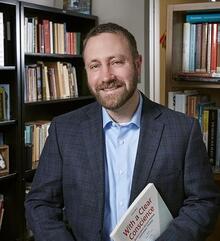
MAID needs to be an authentic choice
End-of-life researcher discusses autonomy, living with dignity and the false choice of MAID

End-of-life researcher discusses autonomy, living with dignity and the false choice of MAID
By Jon Parsons University Relations Medical assistance in dying (MAID) raises many ethical issues, one of which is whether an absence of social support makes MAID an authentic choice.
Medical assistance in dying (MAID) raises many ethical issues, one of which is whether an absence of social support makes MAID an authentic choice.
That’s the view of Dr. Andrew Stumpf, an assistant professor of philosophy at St. Jerome’s University, a federated institution of the University of Waterloo. Stumpf’s research focuses on ethics and end-of-life care.
“We need to support and promote people’s autonomy and the right to make important decisions about their body,” Stumpf says. “And what could be bigger than the decision about what happens regarding your death? But we need to be putting at least as much energy and attention into giving people the kind of support they need to live dignified lives.”
With the federal government recently putting a pause on implementing the latest update to MAID, Stumpf says it’s a good time to re-examine key ethical issues.
Under the current rules for MAID, people with what are defined as grievous and irremediable medical conditions may seek assistance in ending their own lives. But sometimes this is not happening because of any medical condition on its own, but because they cannot access adequate housing or health-care.
Such cases have been widely reported in Canada in recent years, for example in CBC, Global News, CTV News, and City News.
“Having adequate social supports for people is a huge investment, but it’s something we need to do,” Stumpf continues. “It seems our current cultural attitude says, well, when you’re older or disabled, we just shift you off to the side and forget about you, but now here’s this other option of MAID you can avail yourself of. We need to be doing better on programs and supports that allow people to live their lives fully.”
One key support that Stumpf sees as central to any discussion around MAID is palliative care – an approach to health-care and quality of life for people with serious or terminal illnesses. Palliative care is not always specific to immediate end-of-life care and may be appropriate for people who have illnesses for many years.
“The current approach makes MAID available to people and lets everybody know about MAID, but most people don’t know much about palliative care,” Stumpf says. “And palliative care is not readily accessible to people, at least in a high-quality form. That’s not really promoting autonomy, as I see it.”
Expanding availability and awareness of palliative care and providing adequate social support are things he sees as fundamental to creating authentic choices for MAID.
As part of his ongoing research, Stumpf founded the Kernel Network, an organization that aims to foster collaboration between academics and community partners on end-of-life research.

Read more
Systemic factors need to be acknowledged and addressed

Read more
Waterloo School of Pharmacy alum speaks to the benefits of the Minor Ailments Program

Read more
The province could save upwards of $42 million a year, according to a new study from reseachers at the University of Waterloo.
The University of Waterloo acknowledges that much of our work takes place on the traditional territory of the Neutral, Anishinaabeg, and Haudenosaunee peoples. Our main campus is situated on the Haldimand Tract, the land granted to the Six Nations that includes six miles on each side of the Grand River. Our active work toward reconciliation takes place across our campuses through research, learning, teaching, and community building, and is co-ordinated within the Office of Indigenous Relations.